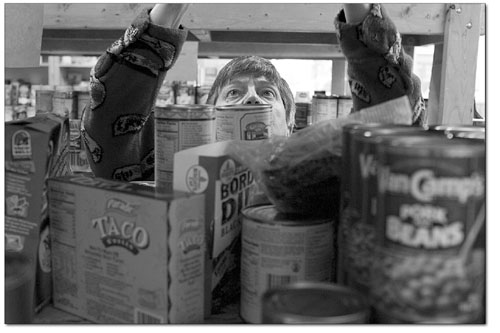|
| ||
| Hungry for the holidays SideStory: A question of food security – Coloradoans going hungry
by Will Sands Last year, 2,432 needy people took nearly 78,000 pounds of food out the door of the Durango Food Bank. This year, that same poundage won’t even come close to satisfying local hunger. Like many social organizations in the Durango area, the food bank is struggling to cover local needs Normally, the Durango Food Bank distributes between 7,000 and 8,000 pounds of food per month to help hungry families and individuals. However, the bank has shattered all of its records in recent months. Growing hunger among Durangoans coupled with a drop in donations has also forced the Durango Food Bank into a first-time predicament – having to go out and pay for groceries. “We’re breaking records in terms of the numbers of people we’re serving almost weekly,” said Renea Young, director of the Food Bank. “We normally distribute up to 8,000 pounds of food per month, but we’re doing considerably more than that right now. Plus, we used to rely exclusively on donations, and now we’re having to buy a lot more food.” The Durango Food Bank’s experience is mirrored at Manna Soup Kitchen. Al Spungen, who took over as Manna’s director in October, has seen a jump in the number of meals the kitchen serves in just the last few months. “We served a total of 36,000 meals last year, and we’re talking about an average of 100 people a day,” he said. “But just since I’ve been here, I’ve seen that number start to climb. The day before Thanksgiving, we served 128 people, and the numbers have been steady all month.” Young and Spungen have also seen a change in the type of person coming through their doors. Increasingly, families with steady employment are having to rely on their helping hands. “Not everyone who comes to Manna is homeless,” Spungen said. “We’re seeing a lot of families, and these are people who are working full-time jobs to make ends meet. But people have to pay the bills and still eat, and it’s becoming difficult.” The Durango Food Bank has also seen its focus widen to include working families according to Young, “We used to see primarily single mothers with children,” she explained. “Now, we’re seeing more families than ever before. I don’t know what to attribute it to. It seems like there’s a lot of work available, but the pay isn’t always high enough to cover the cost of living in Durango.” John Gamble, Volunteers of America division director and supervisor of the Durango Community Shelter and Southwest Safehouse, concurred that the local cost of living is getting beyond many people’s means. “Most able-bodied adults in our shelters go to some kind of employment every day,” he said. “It’s the challenge of finding both workable employment and housing that’s difficult. Wages have not kept pace with the cost of living and have not even approached the local cost of housing.” In addition, the federal government has been less than generous with less-fortunate Americans in recent years. Numerous social programs have been trimmed or cut, while organizations like the food bank, Manna and the VOA are facing mounting costs. “What we’ve seen in the last several years is that federal programs have sort of stalled out,” Gamble said. “At the same time, we’re seeing, if nothing else, inflationary increases in costs. The result is that all of the programs that are serving the most hungry and the most needy people are struggling.” Like Young and Spungen, Gamble said that demand for services is only going up. “Last winter, we had a couple deaths of campers in the area, so we put in a proactive winter overflow program,” he said. “Last night, we had our first camper on a cot in the dining room plus we’re feeding an average of about 40 people a night. The homeless shelter is a busy place in Durango.” Even though supplies are short and demand is high, the food bank, soup kitchen and shelter all say they are fortunate to be operating in a town like Durango. “It’s too bad that there’s so much hunger,” Spungen said in closing. “But it is good that there are places like Durango that are doing something about it.” Gamble added, “This community has always been very generous, and these organizations keep on doing their good works in spite of a pretty bleak reality.”
|
In this week's issue...
- December 18, 2025
- Let it snow
Although ski areas across the West have taken a hit, there’s still hope
- December 18, 2025
- Look, but don't take
Lessons in pottery theft – and remorse – from SW Colorado
- December 11, 2025
- Big plans
Whole Foods, 270 apartments could be coming to Durango Mall parcel


